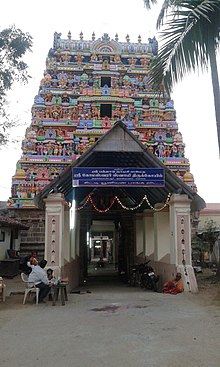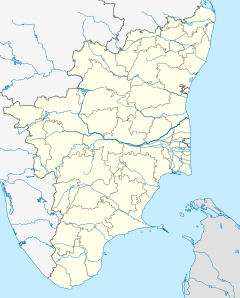| Kodeeswarar Temple | |
|---|---|
 Image of the Kodeeswarar temple gopuram Image of the Kodeeswarar temple gopuram | |
| Religion | |
| Affiliation | Hinduism |
| District | Thanjavur |
| Deity | Kodeeswarar Pandhadu Nayagi |
| Festivals | Maha Shivaratri |
| Location | |
| Location | Kottaiyur |
| State | Tamil Nadu |
| Country | India |
 | |
| Geographic coordinates | 10°58′01″N 79°21′30″E / 10.966845°N 79.358225°E / 10.966845; 79.358225 |
| Architecture | |
| Type | Dravidian architecture |
| Specifications | |
| Temple(s) | One |
| Elevation | 51.58 m (169 ft) |
Kodeeswarar Temple (Tamil: : கொட்டையூர் கோடீஸ்வரர் கோயில்) is a Hindu temple dedicated to Lord Shiva, located in Kottaiyur, a village on the western outskirts of Kumbakonam, in Thanjavur district, Tamil Nadu, India. Shiva is worshipped as Koteeswarar and His consort Parvathi as Pandhadu Nayaki. Lord Koteeswarar is revered in the 7th century Tamil Saiva canonical and greatest work, Tevaram, written by Tamil saint poets known as the Nayanmars and classified as Paadal Petra Sthalam, the 275 temples revered in the canon.
The temple has a five-tiered Raja Gopuram, the entrance tower and all the shrines are enclosed in rectangular walls. The temple has four daily rituals at various times from 6:00 a.m. to 8 p.m., and three yearly festivals on its calendar, namely Margaḻi Tiruvathirai during the Tamil month of Margaḻi (December–January), Shivaratri in February–March, Panguni Uthiram during Panguni (March–April) and Arrow festival during Purattasi (September–October) being the most prominent. The temple is maintained and administered by the Hindu Religious and Endowment Board of the Government of Tamil Nadu.
Legend

As per Hindu legend, Suruchi, the son of Sathyarthi, the ruler of Trihartha kingdom, took the form of a devil on account of a curse. On account of disfigure, people ran away on seeing him. He prayed to Shiva and was advised to take a holy dip in the spring in the temple. He got his original form and the belief is followed in modern times, where ladies take a holy dip to get a better appearance. As per another legend, sage Herandar (Athreya) is believed to have worshipped Shiva at this place. Pandhadu Nayagi, meaning Goddess playing with a ball, got her name as she is believed to toss the curses of devotees off their suffering. Shiva is believed to have appeared in ten million (called kodi in Tamil) forms of Vinayaga, Parvathi and Muruga and hence got Koteeswarar as his name.
Architecture

The temple is located 5 km (3.1 mi) north-west of Kumbakonam on the Kumbakonam–Swamimalai road. Kodeeswarar temple has a rectangular plan with two prakarams (outer courtyard) covering an area of 1 acre (0.40 ha) and a five-tiered rajagopuram (gateway tower) facing East. The central shrine faces east and houses the image of Kodeeswarar (Shiva) in the form of lingam made of granite. There is a separate shrine for Vinayagar and Murugan on both sides of the entrance to the sanctum. The granite images of Nandi (the bull and vehicle of Shiva), a tall flag staff and a Balipeeta, the place of offering, axial to the sanctum. As in other Shiva temples of Tamil Nadu, the first precinct or the walls around the sanctum of Kodeeswarar has images of Dakshinamurthy (Shiva as the Teacher), Durga (warrior-goddess) and Chandikeswarar (a saint and devotee of Shiva). The temple precinct is surrounded by granite walls. The images of Navagraha, the planetary deities is unique that they are depicted with all their chariots.
Worship and religious practises

The temple priests perform the puja (rituals) during festivals and on a daily basis. The temple rituals are performed four times a day; Kalasanthi at 7:30 a.m., Uchikalam at 11:30 a.m., Sayarakshai at 6:00 p.m and Arthajamam at 8:00 p.m.. Each ritual comprises four steps: abhisheka (sacred bath), alangaram (decoration), naivethanam (food offering) and deepa aradanai (waving of lamps) for Koteeswarar and Pandadu Nayagi. There are weekly rituals like somavaram (Monday) and sukravaram (Friday), fortnightly rituals like pradosham, and monthly festivals like amavasai (new moon day), kiruthigai, pournami (full moon day) and sathurthi. Margaḻi Tiruvathirai during the Tamil month of Margaḻi (December–January), Shivaratri in February–March, Panguni Uthiram during Panguni (March–April) and Arrow festival during Purattasi (September–October) are the four festivals celebrated in the temple.
Religious significance
The temple is counted as one of the temples built on the northern banks of River Kaveri. It is one of the shrines of the 275 Paadal Petra Sthalams – Shiva Sthalams glorified in the early medieval Tevaram poems by Tamil Saivite Nayanar Tirunavukkarasar. Tirunavukkarasar describes the feature of the deity of Kottaiyur and Tiruvalanchuzhi as:
பொடியாடு மேனிப் புனிதன் கண்டாய் புட்பாகற் காழி கொடுத்தான் கண்டாய்
இடியார் கடுமுழக்கே றூர்ந்தான் கண்டாய் எண்டிசைக்கும் விக்காகி நின்றான் கண்டாய்
மடலார் திரைபுரளுங் காவிரி வாய் வலஞ்சுழியின் மேவிய மைந்தன் கண்டாய்
கொடியாடு நெடுமாடக் கொட்டை யூரிற் கோடீச் சரத்துறையுங் கோமான் தானே.
The Mahasamprokshanam also known as Kumbabishegam (consecration) of the temple was held on 26 October 2015.
Specialty
12 Shiva temples are connected with Mahamaham festival which happens once in 12 years in Kumbakonam. They are :
- Kasi Visanathar Temple,
- Adi Kumbeswarar Temple,
- Someswarar Temple,
- Nageswaraswamy Temple,
- Kalahasteeswarar Temple,
- Gowthameswarar Temple,
- Kodeeswarar Temple,
- Amirthakadeswarar Temple,
- Banapuriswarar Temple,
- Abimukeswarar Temple,
- Kambatta Viswanathar Temple and
- Ekambareswarar Temple.
This temple is one among them.
Kumbakonam Sapta Stana Temple
This is one of the Saptha Stana Temples of Kumbakonam. During the Mahahaman of 2016 the palanquin festival was held on 7 February 2016. Following the tirttavari held at Mahamaham tank on 21 April 2016, the palanquin festival of the Sapta Stana Temples were held on 23 April 2016. The festival which started from Kumbesvara Temple at the 7.30 p.m. of 23 April 2016 completed on the morning of 25 April 2016 after going to the following temples.
- Adi Kumbeswarar Temple, Kumbakonam
- Amirthakadeswarar Temple, Sakkottai
- Avudainathar Temple, Darasuram
- Kabartheeswarar Temple
- Kottaiyur Kodeeswarar Temple
- Kailasanathar Temple, Melakaveri
- Swaminatha Swamy Temple
References
- ta:கொட்டையூர் கோடீஸ்வரர் கோயில்
- ^ "Sri Koteeswarar, Kailasanathar temple temple". Dinamalar. 2014. Retrieved 24 November 2015.
- Ayyar, P. V. Jagadisa (1991). South Indian shrines: illustrated. New Delhi: Asian Educational Services. p. 246. ISBN 81-206-0151-3.
- Ka. Vi., Kannan (2019). River cauvery the most battl(r)ed. Notion Press. p. 43. ISBN 9781684666041.
- Tirunavukkarasar Tevaram, VI: 73:4
- "Vedaranyeswarar temple 'kumbhabhishekam' draws thousands". The Hindu. 27 October 2015. Retrieved 28 October 2015.
- Mahamaham Festival 2004 (in Tamil), Hindu Religious and Charitable Endowments Administration Department, Government of Tamil Nadu, 2004
- கும்பகோணம் ஆதிகும்பேஸ்வரசுவாமி கோயிலில் சப்தஸ்தான பல்லக்கு வெள்ளோட்டம், தினமணி, 8 பிப்ரவரி 2016
- ஆதி கும்பேஸ்வரர் கோயிலில் ஏழூர் பல்லக்கு பெருவிழா, மகாமகக்குளத்தில் தீர்த்தவாரி, தினமணி, 22 ஏப்ரல் 2016
External links
- "Kodeeswarar Temple, Tirukkottaiyur". Shiva Temples of Tamil Nadu, Paadal Petra Sivasthalangal.
Photogallery
-
Vimana
-
Inner prakara
-
Nandhi and Balipeeta
-
Inner prakara
-
Sculpture in kosta
-
Sculpture in kosta
-
Main entrance
| Saptha Stana Temples | |
|---|---|
| State | Tamil Nadu |
| District | Thanjavur district, Nagapattinam district, Tiruvarur district, Mayiladuthurai district (Chola Nadu) |
| Thiruvaiyaru Sapthas Stana Temples | Thiruvaiyaru |
| Kumbakonam Sapthas Stana Temples | Kumbakonam
|
| Chakkarapalli Sapthas Stana Temples (Saptha Mangai Temples) | Chakkarapalli
|
| Mayiladuthurai Sapthas Stana Temples | Mayiladuthurai
|
| Karanthattankudi Sapthas Stana Temples |
|
| Nagapattinam Sapthas Stana Temples | |
| Tirunallur Sapthas Stana Temples |
|